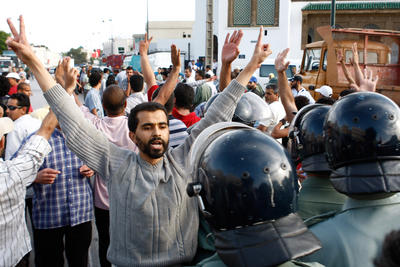Here, Northeast Asia’s own experiences make it uniquely qualified to play an important role in the region’s transition.
The challenges faced by the nations of the Middle East and North Africa will be much greater than those faced by Eastern Europe. In Eastern Europe, many reforming governments possessed an important advantage: the twin goals of joining NATO and the EU. Because NATO and the EU were established entities with strong institutions, the plans for membership in each provided guidelines and assistance in taking the steps needed to move Eastern Europe from communist, command economies to free-market democracies. There is no analogous path for the nations of the Middle East to follow.
The seriousness of the challenge ahead should not be underestimated. One consequence of the changes occurring in the Arab world is greater instability in the near term. While it is still unclear how far and profoundly the changes will spread, instability in a region with the world’s largest oil reserves presents risks to the broader global economy.
Further, the Middle East and North Africa are also growing markets for products from Northeast Asia with significant rises in exports to the region from China, Japan and South Korea over the past ten years.
So, is Northeast Asia able to play a positive role in the transitional period for the Middle East and North Africa?
The world has changed significantly since Eastern Europe opened to the West. The US is no longer the world’s unchallenged superpower and the recent financial and economic crises have affected its and Europe’s ability to play a dominant role. In addition, the US and Europe are viewed with scepticism and caution, and may not be a completely welcome source of help as countries work to build their own future.
With nothing equivalent to the EU available to help guide the transitions in the Middle East and a clear need for assistance, the transition represents an opportunity for Northeast Asia to contribute to positive change. Northeast Asia has had successful and fairly diverse experiences dealing with economic reform. Japan, China and particularly South Korea have an opportunity to make useful contributions to the transition in the Middle East through international organisations.
South Korea, which is part of the G20 leadership, is well placed to work with the current French G20 presidency to build upon the development action plan agreed on in November at the G20 summit in Seoul. Since the G20 includes both advanced and developing nations, it may be viewed in a positive light in the region and have more practical experience to draw on.
South Korea is well equipped to work through the G20 on economic development in the region. While all members of the G20 have a stake in the Middle East, it was at Seoul’s initiative that development was put on the G20 agenda. In a practical sense, South Korea’s own developmental experience in the aftermath of the Korean War help it to better understand many of the challenges Egypt and its neighbours face. South Korea has also been involved for decades in sizeable infrastructure projects in the region, resulting in priceless project management expertise.
With Seoul’s G20 effort to become the ‘bridge’ between the developed and developing world, this may be an opportunity for South Korea to be an example not only of economic development but also political reform and progress.
In addition to work within the G20, South Korea, China and Japan could establish or enhance preferential trade programs to allow duty-free import of goods from the Middle East and North Africa for a set period of time, with the aim of negotiating free trade agreements (FTAs) to replace the preferential trade programs. The use of short-term duty-free status would provide an immediate economic boost, while the eventual adoption of FTAs would help lock in broader economic reforms.
The Arab Spring has caught the world’s attention, but the long-term economic reform of the region will be of critical interest for Northeast Asia. There may not be the capacity to do what the EU did in Eastern Europe, but South Korea, China and Japan can draw from their own experiences and their standing in international institutions to help guide the states of the Middle East through this transition. At the same time, they are also well placed to provide economic aid to help build the capacity needed to create the economic growth that will lead to broader regional stability.
Troy Stangarone is the Director of Congressional Affairs for the Korea Economic Institute. Greg Scarlatoiu is the Executive Director at Committee for Human Rights in North Korea.
This is a digest of a longer article which first appeared here on Global Asia.

